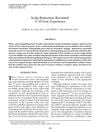 June 1996 in “Irish Journal of Medical Science (1971 -)”
June 1996 in “Irish Journal of Medical Science (1971 -)” The document summarizes medical findings on topics like heart rhythm treatment, sleep apnea therapy, and various health conditions and treatments.
 239 citations,
November 2000 in “Journal of The American Academy of Dermatology”
239 citations,
November 2000 in “Journal of The American Academy of Dermatology” Finasteride doesn't effectively treat hair loss in postmenopausal women.
 229 citations,
August 2002 in “Experimental Gerontology”
229 citations,
August 2002 in “Experimental Gerontology” AGA causes hair loss by shrinking hair follicles due to DHT binding, and can be treated with finasteride and minoxidil.
 56 citations,
April 1998 in “Steroids”
56 citations,
April 1998 in “Steroids” Finasteride reduces hair loss and treats BPH without major hormone changes, but may cause sexual dysfunction.
 45 citations,
November 2009 in “British Journal of Dermatology”
45 citations,
November 2009 in “British Journal of Dermatology” Women with early hair loss have higher blood pressure and aldosterone; screening and treatment may help.
 24 citations,
September 2001 in “Journal of The American Academy of Dermatology”
24 citations,
September 2001 in “Journal of The American Academy of Dermatology” Women's ovarian hormones and adrenal androgens change throughout life, affecting hair loss and health.
 16 citations,
June 2021 in “Journal of Dermatological Treatment”
16 citations,
June 2021 in “Journal of Dermatological Treatment” Minoxidil effectively treats hair loss, especially androgenetic alopecia, but needs more research for better understanding.
 13 citations,
June 2015 in “International Journal of Dermatology”
13 citations,
June 2015 in “International Journal of Dermatology” Non-obese women with hair loss have higher heart disease risk.
 10 citations,
October 2018 in “Sexual medicine reviews”
10 citations,
October 2018 in “Sexual medicine reviews” Men using hair loss drugs like finasteride may experience sexual side effects like erectile dysfunction, but it's unclear who will be affected and when. Treating depression and sexual symptoms is suggested, as these men often have higher rates of both. More research is needed to understand why these side effects occur.
 10 citations,
December 1995 in “Journal of women's health”
10 citations,
December 1995 in “Journal of women's health” Finasteride reduces hair growth in women with hirsutism and works better with electrolysis.
 9 citations,
February 2020 in “International Journal of Endocrinology”
9 citations,
February 2020 in “International Journal of Endocrinology” Some men with early hair loss may have a male version of PCOS, affecting hormones and increasing health risks.
 1 citations,
May 2013 in “Journal of the Egyptian Women's Dermatologic Society (Print)”
1 citations,
May 2013 in “Journal of the Egyptian Women's Dermatologic Society (Print)” Women with hair loss have higher heart disease risk and unhealthy cholesterol levels.

Drinking sweetened tea and late bedtimes increase the risk of hair loss in women.

Drinking sweetened tea and poor sleep habits increase the risk of hair loss in women.

Drinking sweetened tea and poor sleep increase the risk of hair loss in women.
 January 2017 in “Acta dermato-venereologica”
January 2017 in “Acta dermato-venereologica” The congress showed that psychological therapy can help skin condition patients, social media affects acne stigma, education improves atopic dermatitis, and patient satisfaction in dermatology is high, especially with good doctor engagement.

Women with androgenetic alopecia (hair loss) have normal prostate specific antigen levels but higher testosterone levels.
 8 citations,
April 2016 in “Anais Brasileiros De Dermatologia”
8 citations,
April 2016 in “Anais Brasileiros De Dermatologia” Right hand finger ratio may predict male hair loss.
 4 citations,
August 2017 in “Journal of Cosmetic Dermatology”
4 citations,
August 2017 in “Journal of Cosmetic Dermatology” Finger length ratio may indicate male hair loss.
 1 citations,
October 2008 in “Expert Review of Dermatology”
1 citations,
October 2008 in “Expert Review of Dermatology” Frontal Fibrosing Alopecia is a slowly progressing hair loss condition, likely underdiagnosed, with ineffective treatments, needing more research to understand it fully.
 December 2002 in “International Journal of Cosmetic Surgery and Aesthetic Dermatology”
December 2002 in “International Journal of Cosmetic Surgery and Aesthetic Dermatology” Scalp reduction surgery is safe and effective for certain patients with hair loss, leading to dense hair coverage and high satisfaction.
 70 citations,
January 2000 in “Hormone Research in Paediatrics”
70 citations,
January 2000 in “Hormone Research in Paediatrics” SAHA syndrome is a condition in women involving skin and hair issues, often related to hormonal imbalances, and is treated based on the underlying cause.
 37 citations,
May 1999 in “Australasian Journal of Dermatology”
37 citations,
May 1999 in “Australasian Journal of Dermatology” Early diagnosis and treatment are crucial for preventing permanent hair loss in various scalp conditions, and while new treatments are promising, more research is needed to evaluate their effectiveness.
 17 citations,
September 2003 in “Journal of Investigative Dermatology Symposium Proceedings”
17 citations,
September 2003 in “Journal of Investigative Dermatology Symposium Proceedings” Old treatments for other skin conditions showed promise for hair regrowth in mice with a hair loss condition.
 14 citations,
November 2016 in “Annals of Internal Medicine”
14 citations,
November 2016 in “Annals of Internal Medicine” Tofacitinib, an arthritis drug, helped hair growth in alopecia universalis but long-term safety needs more research.

Drinking sweetened tea and late bedtimes increase the risk of hair loss in women.
 48 citations,
February 2013 in “Molecular and Cellular Endocrinology”
48 citations,
February 2013 in “Molecular and Cellular Endocrinology” The protein StAR is found in 17 different organs and can affect hair loss and brain functions, but its full role is not yet fully understood.
 31 citations,
January 2014 in “Journal of endocrinological investigation”
31 citations,
January 2014 in “Journal of endocrinological investigation” Woodhouse-Sakati syndrome often causes sexual development issues, hair loss, learning disabilities, deafness, muscle contractions, limb pain, and diabetes.
 2 citations,
December 2021 in “Case reports in endocrinology”
2 citations,
December 2021 in “Case reports in endocrinology” The girl's condition improved with treatment, showing no new autoimmune diseases and hair regrowth.
 15 citations,
December 2013
15 citations,
December 2013 Men with more vanadium in their blood and who drink less soy milk are more likely to have hair loss.






























